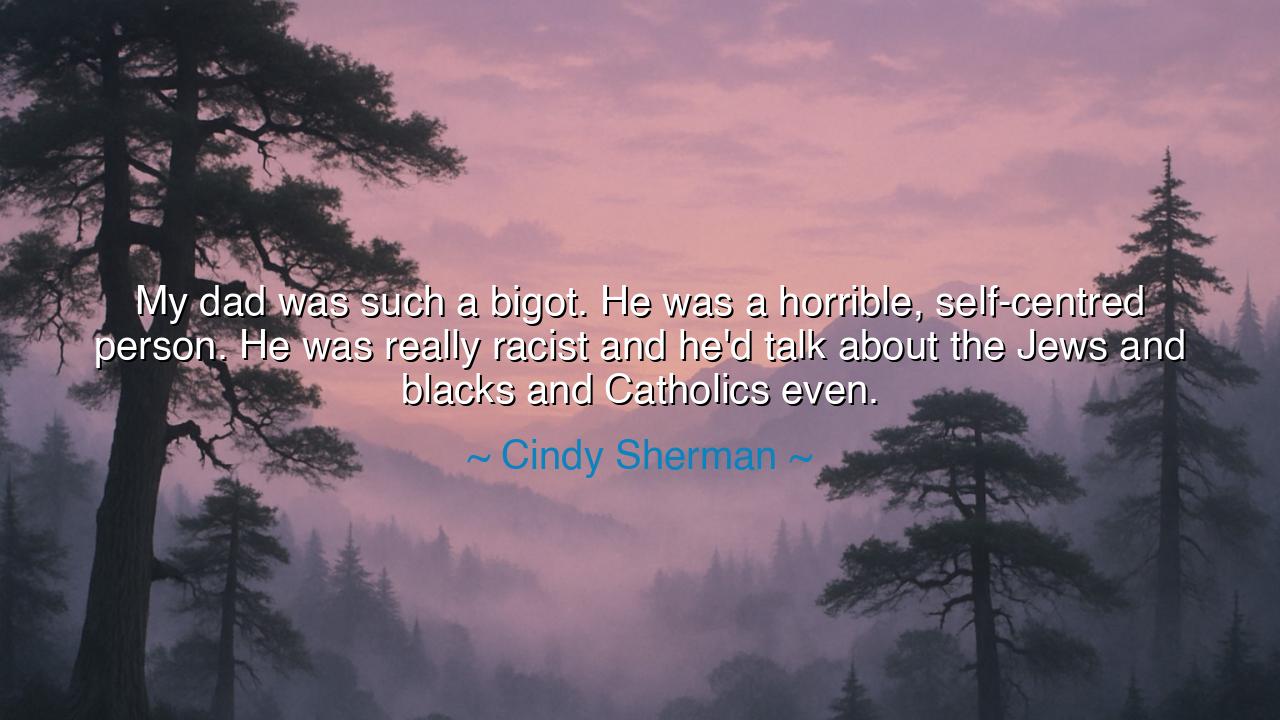
My dad was such a bigot. He was a horrible, self-centred person.
My dad was such a bigot. He was a horrible, self-centred person. He was really racist and he'd talk about the Jews and blacks and Catholics even.






The words of Cindy Sherman — “My dad was such a bigot. He was a horrible, self-centred person. He was really racist and he'd talk about the Jews and blacks and Catholics even” — are not spoken with bitterness alone, but with the heavy clarity of truth. They echo through time as both a confession and a warning — a reminder of how the darkness of prejudice can live within the walls of a home, poisoning generations if it is not confronted. In this confession lies the eternal struggle between inheritance and individuality — between the shadows we are born under and the light we must create for ourselves.
Sherman, an artist who built her name by exploring the masks of identity and the illusions of culture, speaks here not merely of a man, but of an age — a time when ignorance and hatred were taught as tradition, and superiority was mistaken for strength. Her father’s words, filled with bigotry, were not unique to him; they were the echoes of a world that had not yet learned to see humanity as one. But what makes her statement powerful is not only her condemnation of his prejudice — it is the unspoken truth that she did not inherit it. From his narrowness, she drew freedom; from his hatred, she forged understanding.
Throughout history, this pattern repeats: the children of cruelty become the teachers of compassion, the witnesses of hatred become the builders of peace. Consider Frederick Douglass, who was born into slavery and raised under the whip of inhumanity. From the brutality he endured, he did not learn vengeance, but the sacred language of liberty. The chains that bound him became the forge of his eloquence. So too with Sherman — in rejecting her father’s worldview, she joined the ancient lineage of those who break the cycle. Her art, often focused on identity, masks, and the perception of women, can be seen as her rebellion against the false identities that prejudice creates — the masks people wear to justify their own blindness.
In this way, the quote reminds us that evil does not always arrive as a stranger. Sometimes it sits at our table, tells us stories, and calls itself love. Prejudice is not always loud or violent; sometimes it is quiet, clothed in humor or tradition. Sherman’s courage lies in her refusal to romanticize her past, to call evil by any name but its own. For truth must first be spoken before it can be healed. To name corruption is to strip it of its disguise. Silence, by contrast, is the soil in which hatred grows.
And yet, her words also carry a subtle grace. For even in condemning her father’s bigotry, there is no vengeance — only the stern compassion of truth. She does not glorify pain, nor does she wallow in it. She simply holds it to the light, saying: this is what was, and this is what must never be again. This is the mark of those who transform their wounds into wisdom. To confront the sins of one’s family, and yet refuse to repeat them, is among the highest forms of moral courage.
From the ashes of her father’s prejudice, Sherman’s art arose like a mirror to society. Through her photographs, she forced the world to confront the false images it clings to — of gender, of race, of perfection. In rejecting her father’s narrowness, she learned to see beyond all masks, to reveal the fragile, complex humanity that lives beneath them. Thus, her statement is not only about personal pain; it is about the rebirth of vision — the reclaiming of one’s right to see the world with clear eyes and an open heart.
Let this, then, be the lesson for all who listen: Do not allow the prejudice of the past to chain your spirit. To be born among the blind is not to remain blind; to be raised in hatred is not to love hate. The noblest rebellion is not to destroy, but to be different — to let the cruelty of others sharpen your compassion. When you encounter bigotry, do not return it with bitterness, but with truth. When you inherit ignorance, do not hide it — transform it into understanding. For the measure of a person’s greatness lies not in the family they come from, but in the humanity they choose to become.
And so, Cindy Sherman’s painful admission becomes a declaration of victory — that from the soil of hate, beauty can still bloom; from the voice of cruelty, art can still rise; and from a narrow heart, a daughter can still learn to love the whole of humankind.






AAdministratorAdministrator
Welcome, honored guests. Please leave a comment, we will respond soon